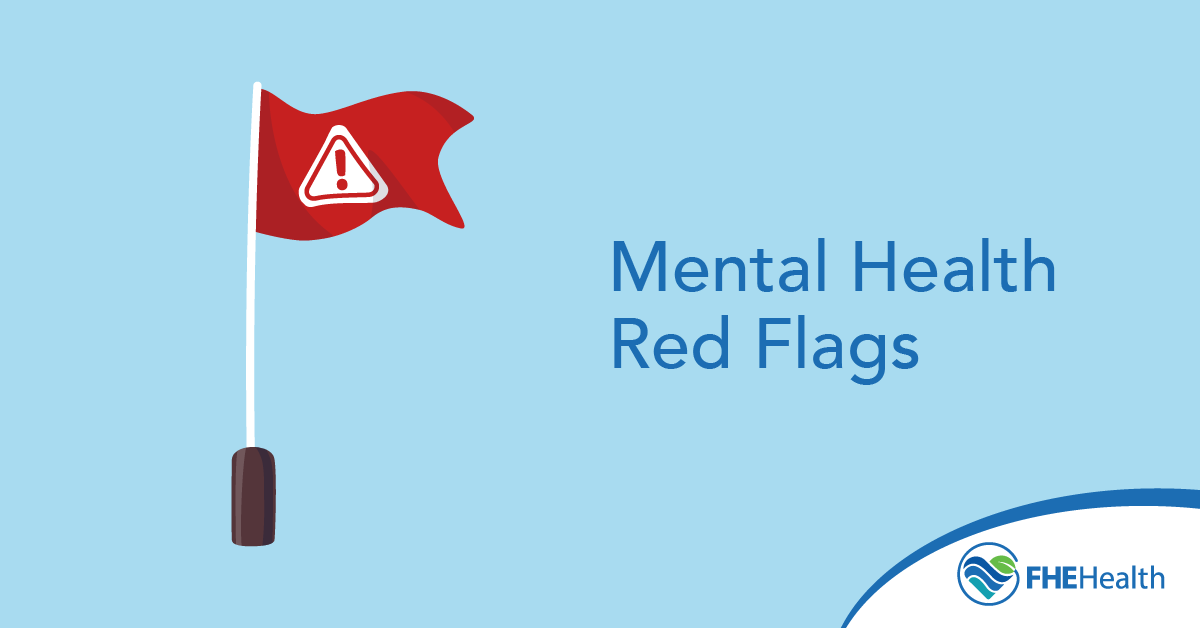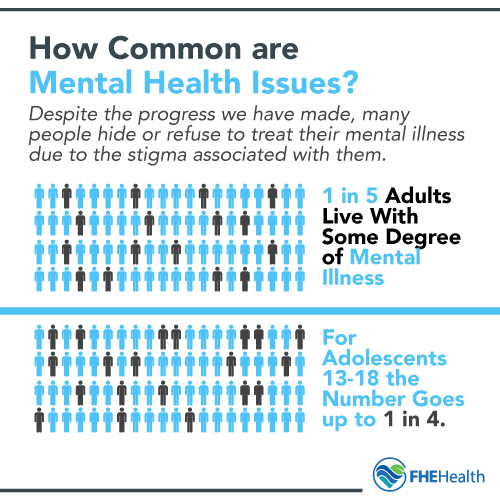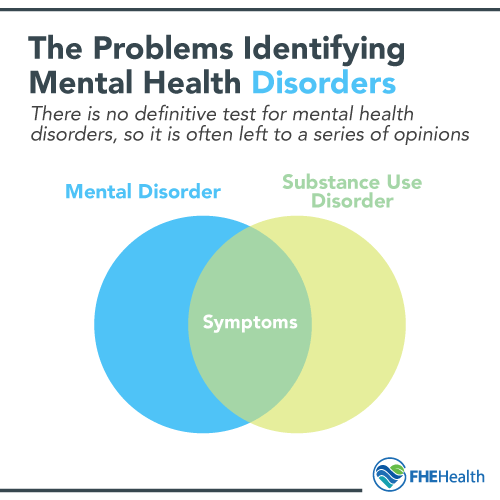
Most people know it’s a good idea to see the dentist for a toothache or a doctor for the flu, but many of these same individuals allow symptoms of mental health problems to go unchecked in themselves and others. This decision to ignore mental health issues is often unintentional. Perhaps they aren’t aware of how many people are affected, don’t understand the subtlety of the symptoms or are influenced by the unhealthy stigma those with mental health issues face.
In truth, mental health conditions affect a large percentage of the population, many of whom are undiagnosed. Signs of these conditions may be easily missed or attributed to other causes, leaving an affected person to push through each day and ignore the discomfort and frustration. Recognizing mental health warning signs early can ensure swift treatment, improving outcomes and giving anyone with these conditions greater control over their lives.

How Common Are Mental Health Issues?
If you’ve never faced the diagnosis of a mental disorder, it’s easy to assume the issue is limited in scope and doesn’t affect you. Even if you know someone with a mental illness, there are likely a few others in your circle who either choose not to disclose their condition or are among the many living without a diagnosis. Perhaps you’ve struggled in some area of your life and wondered whether your mental health was a contributing factor.
In the United States, around 1 in 5 adults lives with some degree of mental illness. This translates to over 40 million individuals who cope with the daily challenges brought on by these disorders. This number jumps to 1 in 4 when looking at adolescents between the ages of 13 and 18. The high number of people experiencing mental health symptoms suggests most Americans are affected by these conditions in some way.
Recognizing the Symptoms of Mental Health Problems

Symptoms of mental health problems are often misunderstood or mistaken for unrelated issues because they frequently resemble physical illnesses or lifestyle challenges. For example, anxiety disorders affect 40 million adults each year, and many people also suffer from depression. A person experiencing chronic fatigue, concentration problems or breathlessness can easily believe they have an ailment unrelated to mental health. Since there are no definitive lab tests for most mental disorders, recognizing the problem requires noticing changes in emotional, behavioral and physical patterns.
Common warning signs between conditions can sometimes lead doctors down the wrong diagnostic path, delaying appropriate treatment. This also applies to support from friends and family. Someone with depression may be encouraged to “change their perspective” or “kick themselves out of it.” This can reinforce the narrative that the person is failing by choice and needs to try harder.
Emotional Red Flags
Persistent low mood, excessive worry and dramatic mood swings are some of the most common emotional signs of mental health issues. These tend to persist, intensify over time and interfere with daily functioning.
What to watch for:
- Ongoing sadness, emptiness or hopelessness
- Excessive guilt or self-criticism
- Chronic anxiety or constant worry
- Loss of interest in activities once enjoyed
- Sudden emotional outbursts or unpredictable mood changes
Behavioral Red Flags
Mental health challenges often show up in our actions. Social withdrawal, difficulty concentrating and engaging in impulsive or risky behaviors can all point to deeper underlying issues, especially when these actions are new or worsening.
What to watch for:
- Avoiding friends, family or social events
- Forgetting obligations or struggling to stay focused
- Procrastinating or abandoning responsibilities
- Interrupting others or speaking impulsively
- Engaging in reckless actions such as substance use or unsafe driving
Physical Red Flags
Changes in the body can reflect changes in the mind. Sleep problems, chronic fatigue and unexplained aches or digestive issues may indicate an underlying mental health concern, particularly when no clear medical cause is found.
What to watch for:
- Insomnia or excessive sleeping
- Constant tiredness or low energy
- Muscle tension, especially in the shoulders or jaw
- Headaches, stomach issues or general body aches
- Changes in appetite or weight
When to Seek Immediate Help
Warning signs of poor mental health can be difficult to identify because they’re often things we all experience in our daily lives. It’s normal to feel anxious or sad sometimes. However, when these feelings begin to affect your ability to function or are accompanied by irrational and intrusive thoughts, it’s time to consider immediate intervention. Even common mood swings can be a symptom when they occur at regular intervals and seemingly without cause.
Early detection of mental health issues allows you, or someone you know, the opportunity to prevent the condition from worsening. It also has a positive impact on the overall cost of care and can prevent people from attempting to self-medicate through substance abuse. It’s important to rule out any underlying medical conditions initially, but mental health should be considered as a factor.
How to Respond When You See the Warning Signs
If you’ve begun to notice mental health issues, the first and most important step is not to dismiss them. It’s easy to rationalize changes in mood, energy, focus or behavior as temporary, especially when life seems busy or overwhelming. But when these patterns persist or begin to interfere with how you function day to day, they deserve attention.
Responding to these signs begins with giving yourself permission to take them seriously. This may involve acknowledging difficult emotions you’ve been avoiding or confronting the idea that something deeper might be affecting your well-being. Most people feel some degree of discomfort when they begin to question their mental health. The key is not to let that discomfort prevent you from acting.
One of the most effective responses is to slow down and pay attention. Rather than pushing through or blaming yourself, take stock of what’s changed. Are you sleeping significantly more or less than usual? Are you withdrawing from people you care about? Do you find it hard to concentrate or feel overwhelmed by things that used to seem manageable?
Taking note of these patterns can help you clarify whether what you’re experiencing is situational or something that might require professional support. You don’t have to have it all figured out, and you don’t need to be certain something is wrong to explore further.
Seeking Help Is Critical
If you notice concerning mental health signs, it’s important to seek treatment as soon as possible. This can be more difficult if you see possible symptoms in someone else because some individuals may be resistant to therapy options. Remember that therapy is beneficial even for those who don’t have a mental disorder, and critical self-evaluation is healthy for everyone.
Making the decision to explore treatment options offers an opportunity to understand your disorder. This can relieve you of any guilt you may feel about the impact symptoms have had on your life. Accepting treatment after a diagnosis can help you take your life back and ensure you don’t become one of the 25%-30% of homeless individuals with severe mental illness.
Mental illness also plays a large role in criminal behavior, substance abuse and suicidal thoughts. Establishing a relationship with a qualified professional ensures you have the support you need to maintain your quality of life and prevent negative outcomes.
Treatment provides resources to give you confidence as you navigate your life with your new diagnosis. It can be powerful to finally understand the cause of your frustrations, but it can also be confusing to weave the information into your identity. Having an ally who understands your experience can help ease this transition.
FHE Health Is Here to Help
If you recognize possible early warning signs of mental illness in yourself or others, FHE Health has the staff and experience to help you take your life back. Our counselors are available at all hours to provide compassionate guidance toward a future with you in control of your destiny.
We offer full-service mental health rehabilitation programs to ensure we can meet all your needs. Contact our team today and we’ll develop a customized treatment plan to get you on the road to recovery.






